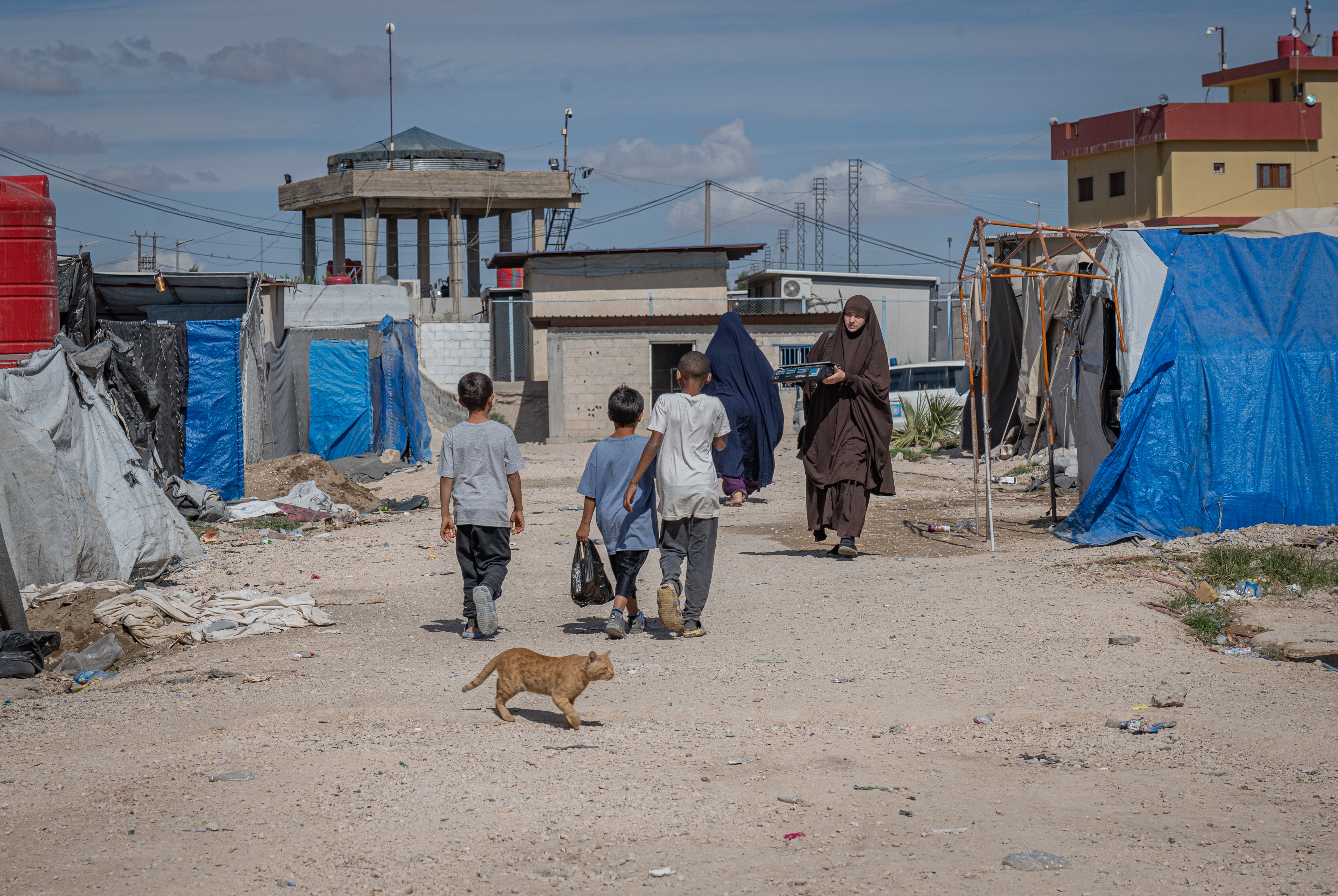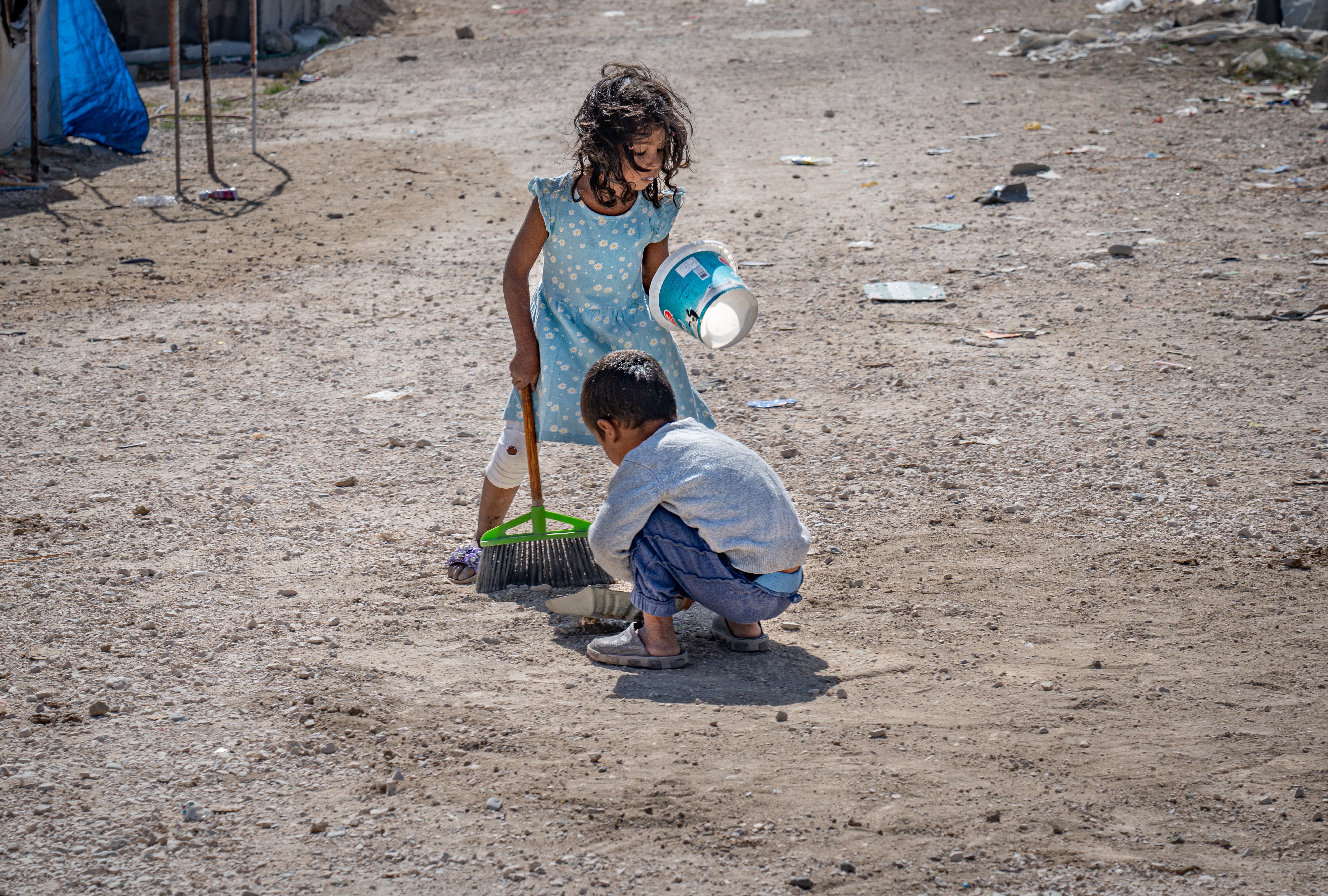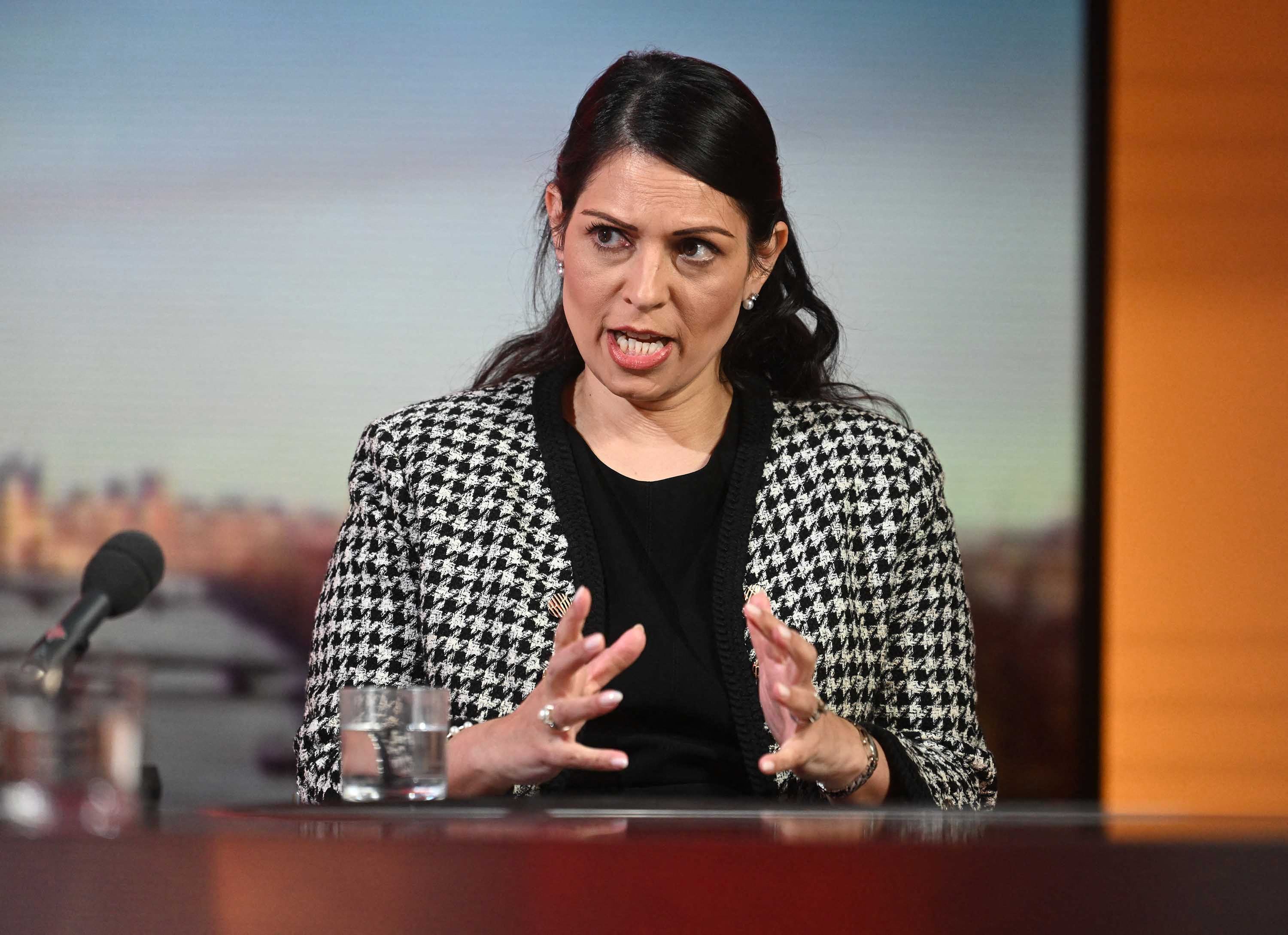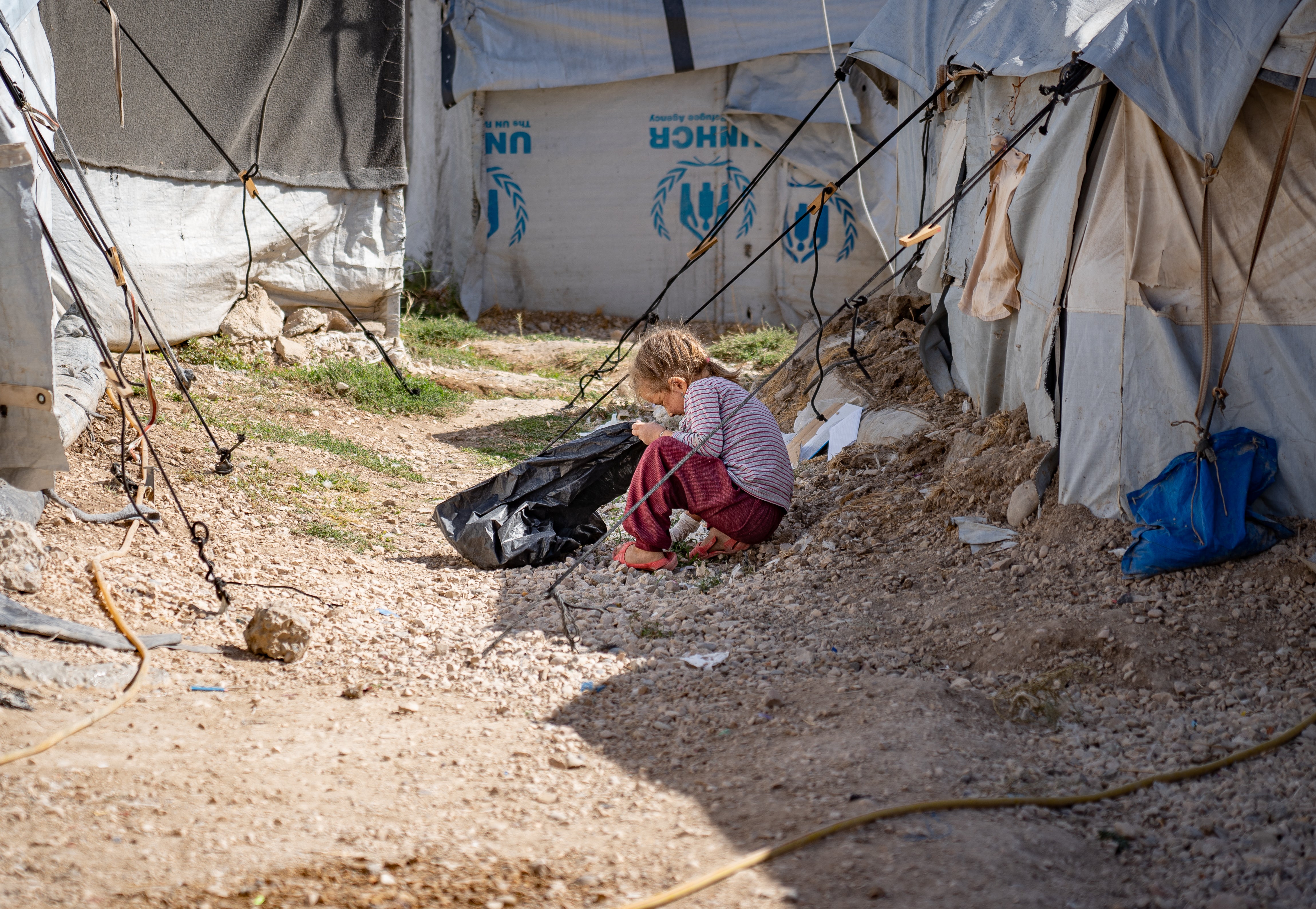Abandoned in Syria: The British mother whose citizenship was stripped without warning
The UK wants to push through a bill widening its powers to strip Britons of their citizenship. Bel Trew, in Roj, northeast Syria, meets families left in limbo


Your support helps us to tell the story
From reproductive rights to climate change to Big Tech, The Independent is on the ground when the story is developing. Whether it's investigating the financials of Elon Musk's pro-Trump PAC or producing our latest documentary, 'The A Word', which shines a light on the American women fighting for reproductive rights, we know how important it is to parse out the facts from the messaging.
At such a critical moment in US history, we need reporters on the ground. Your donation allows us to keep sending journalists to speak to both sides of the story.
The Independent is trusted by Americans across the entire political spectrum. And unlike many other quality news outlets, we choose not to lock Americans out of our reporting and analysis with paywalls. We believe quality journalism should be available to everyone, paid for by those who can afford it.
Your support makes all the difference.Stuck in a detention camp in Syria, British mother Sara explains how she only learnt that her citizenship had been revoked over a year after it happened by chance because the UK government failed to inform her.
Sara, whose name has been changed, spoke to The Independent from Roj, a sprawling and ramshackle camp in the desert in northeast Syria. It is home to more than 2,500 foreign women and children, including several British-born detainees such as Sara and Shamima Begum, who left the UK several years ago to live under the Islamic State’s caliphate.
Her prospects of ever going home are bleak, and her case is not unique.
Dozens of people have been stripped of their British citizenship for the “public good” in recent years by the UK, which is now pushing for the power to do so without informing anyone – a tactic that legal experts say would effectively cut off the chance of appeal.
The British government is drafting a contentious bill that would enable the UK to revoke someone’s citizenship without notifying them in a range of circumstances.
This trend and proposed legal change have sparked alarm among activists, NGOs and British lawmakers who say that the UK should take responsibility for its citizens rather than leave them in limbo abroad. In the case of Syria, many women and girls there were groomed online and are victims of trafficking who need support, they say.
Global rights group Reprieve, which is assisting people like Sara, wants the UK to bring these individuals home – even if that means they end up facing trial on terror charges.
But that is nigh-on impossible if these people are no longer considered British.
Between 2017 and 2018, the UK’s use of controversial powers to remove British citizenship increased more than sixfold from 14 to 104, according to the latest publicly available data.
Many of the people targeted had alleged connections to Isis as the government seeks to prevent radicalised individuals and jihadis returning from Syria.
Sara, who is so frail she struggles to walk, says she only found out about her citizenship being revoked this year because her family in the UK by chance checked, and then phoned her with the news.
“I knew nothing until my [relative] told me he was going to find out more, because he had heard everyone here had their citizenship stripped,” she says in the camp, as her child quietly draws pictures on a piece of scrap paper.
“I was shocked when I eventually found out. No one told me anything. The UK is the only place I know. My whole family is there.”
Sara, who agreed to speak on the condition of anonymity, says the tactic has left her family in dangerous limbo and is particularly unfair on the children of affected women.

Religiously conservative, she said in 2014 she followed her husband to Raqqa, the capital of Isis’s caliphate, and was separated from him when she arrived in the northern city.
Sara claims her phone and documents were taken and that the Isis fighters threatened her and her family with death if they tried to escape. The Independent was unable to verify this.
“I followed my husband, it was the biggest mistake. Every day I regret going there [to Raqqa],” she tells The Independent.
“They should bring British citizens back to the UK, if we are guilty then we are guilty if innocent we are innocent. I am prepared to face trial.
“My mum, dad, and my siblings are in the UK, I need to go back to my family. It’s where I am from, it’s all I know.”
Sara is one of more than 900 people who are believed to have travelled to Syria and Iraq from the UK to join Isis. Half of them are estimated to have returned but only around 40 have been prosecuted in British courts.
There are thought to be 20 British families currently detained in northeast Syria.
Among them is a British grandmother, also from the north of England, who can only be identified as D4 for legal reasons.
Like Sara, she has lived in Roj camp since early 2019 after she was caught leaving Isis territory. In December 2019 her citizenship was stripped by the UK. However, she was only informed of the decision in October 2020 after her lawyers requested that she be repatriated.
D4 appealed and the High Court ruled in August the government decision was “void and of no effect” because the government had gone beyond its legal powers by removing her British nationality without telling her.
“As a matter of ordinary language, you do not ‘give’ someone ‘notice’ of something by putting the notice in your desk drawer and locking it,” the judgment read. “No one who understands English would regard that purely private act as a way of ‘giving notice’.”
This is what the British government is hoping to change.
It is appealing the August ruling and is trying to push through the draft nationality and borders bill that would allow it to revoke citizenship without informing the individual.
Reprieve says the bill is unnecessary and calculated to inflict “maximum harm and trauma” on the person, their children, and their families.
It is unthinkable that our response to this issue is to abandon British families to die in the desert or worse
In response, a spokesperson for the Home Office said: “British citizenship is a privilege, not a right.
“Deprivation of citizenship on conducive grounds is rightly reserved for those who pose a threat to the UK or whose conduct involves very high harm.”
The Home Office said it always tries to serve a deprivation notice when such a decision is made, and defended the new bill, saying it does not extend its power to revoke citizenship.
“The nationality and borders bill will amend the law so citizenship can be deprived where it is not practicable to give notice; if, for example, there is no way of communicating with the person,” the spokesperson added.
The bill amends the existing British Nationality Act 1981, and exempts the government from having to give notice if it is not “reasonably practicable”, or in the interests of national security or diplomatic relations, for example.
However, Maya Foa – the director of Reprieve – said this was “Home Office spin” and “dangerously misleading”.
The Independent understands that the home secretary can effectively secretly strip British citizens of their nationality on the basis that the Home Office deems it in the “public interest” or because it would damage foreign relations otherwise.
“In practice, what is and is not ‘practicable’ will be at the whim of the home secretary. Priti Patel can already take away all the rights that come with your British passport with a vague nod to the ‘public interest’,” Foa said, describing stripping of citizenship as “an outrageous abdication of government responsibility to protect British citizens”.
“[Ms Patel] now wants to be able to do so without even posting a letter to your last known UK address. That it is not ‘practicable’ to send notice in the mail stretches credulity to the limit.”

Reprieve argues that it effectively removes the right to appeal because the deadline to lodge one is likely to run out before the individual becomes aware they are no longer British.
The group believes the proposed law change would be even more problematic in the cases of the women who have been detained for their alleged Isis connections in Syria.
A Reprieve report published this year said that 63 per cent of them – including Shamima Begum who was groomed online aged just 15 – were victims of human trafficking.
“The government is making no distinction between potential victims of trafficking and people who may have committed crimes,” Foa said, adding that it could open the door for trafficking by terrorist groups in the future.
“It is unthinkable that our response to this issue is to abandon British families to die in the desert or worse.”
The surge in depriving people of their citizenship and the proposed bill have also sparked fierce criticism from British MPs and caused divisions within parliament.
Conservative MP Andrew Mitchell is currently chair of the Trafficked Britons in Syria APPG (all-party parliamentary group), which is seeking a resolution to the cases of people from the UK who were trafficked by Isis, and are now detained in northeast Syria.
“It is wrong that the UK, a leading member of the UN Security Council, is not shouldering its responsibility in this way. We need to take responsibility for these people and not use citizenship as a device,” he told The Independent.
“Leaving Britons stranded in ungoverned space is not in anyone’s interest, including ours.
“Arbitrarily stripping citizenship is not in the interests of any British citizen,“ he added.
There are also concerns that this practice effectively renders many women and children in northeast Syria stateless. While the British Nationality Act 1981 only applies to UK-born dual nationals or those who have a claim to a second nationality, this does not account for the fact that many other governments refuse to recognise or repatriate people with links to Isis.
With no education and no future living in limbo, I worry my child will be radicalised
Shamima Begum, for example, lost her British citizenship in February 2019 but has a claim to Bangladeshi nationality through her mother.
However, the Bangladeshi foreign minister said his country wanted “nothing to do” with Ms Begum. AK Abdul Momen in 2019 warned that Ms Begum would “face the death penalty” for terrorism if she stepped foot in the country, leaving her stranded in the Syrian desert.
Roj camp’s administrative chief told The Independent the burden of care has therefore been dumped on the Kurdish authorities, who are struggling to look after tens of thousands of foreigners in refugee camps and prisons, as well as tens of thousands of displaced Syrians.
“It’s impossibly hard for us, some countries don’t even ask about their citizens,” the chief said, declining to give her name for security reasons.
“These citizens are not our problem. We are doing our part and trying our best but we need help and actual solutions.”
She said she was most worried about the children who are effectively being punished by association, and are living in poor conditions with little medical care and schooling.
Save the Children said in September that children, including Brits, were wasting away in Syrian camps where violence is soaring.
According to its data,three children died and two were critically injured in two separate fires in Roj last year after heaters exploded and started fires. Meanwhile in al-Hol, a sister camp to Roj, 62 children have died over the last year, approximately two every week.
The British government has so far, according to The Independent’s count, repatriated seven children from northeast Syria, which is far lower than other states. In October alone, Germany and Denmark repatriated 37 children and 11 women in a joint operation.

However, most of the women in northeast Syria – like Sara – do not want to be separated from their children. Rights groups argue that children should remain with their caregivers.
“If the UK government is serious about being concerned about the welfare and interests of British children in northeast Syria they should repatriate the small number of British families as an urgent priority,” said Foa of Reprieve.
“To separate them would be to inflict wanton trauma on children who have been through vast amounts of harm”.
The foreign mothers interviewed by The Independent in Roj and al-Hol said their children were suffering the most in the camps, as they could only spend an hour outside each day due to the violence while the education they were receiving was described as rudimentary.
Sara says she is concerned about her child’s future.
“They are not getting the right education, they are learning from their mums,” she says. “With no education and no future living in limbo, I worry my child will be radicalised.
“I don’t know where to go if the UK says I cannot come back – if no one can come back. I think I will go mad.
“I’m ready to face trial and even help other women who are in a similar position to the one I was in. I would convince them not to go. Ending up in Raqqa is the biggest regret of my life.”



Join our commenting forum
Join thought-provoking conversations, follow other Independent readers and see their replies
0Comments